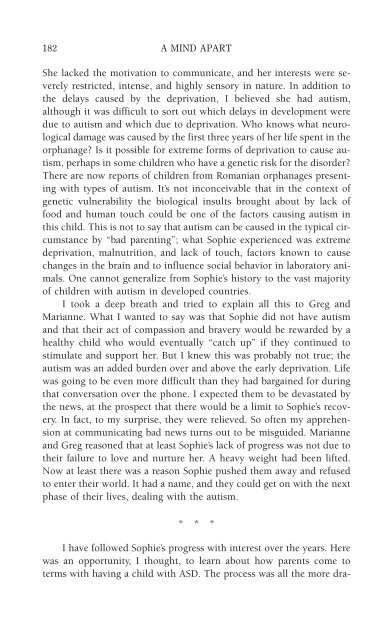978-1572305441
autism
autism
Create successful ePaper yourself
Turn your PDF publications into a flip-book with our unique Google optimized e-Paper software.
182 A MIND APART<br />
She lacked the motivation to communicate, and her interests were severely<br />
restricted, intense, and highly sensory in nature. In addition to<br />
the delays caused by the deprivation, I believed she had autism,<br />
although it was difficult to sort out which delays in development were<br />
due to autism and which due to deprivation. Who knows what neurological<br />
damage was caused by the first three years of her life spent in the<br />
orphanage? Is it possible for extreme forms of deprivation to cause autism,<br />
perhaps in some children who have a genetic risk for the disorder?<br />
There are now reports of children from Romanian orphanages presenting<br />
with types of autism. It’s not inconceivable that in the context of<br />
genetic vulnerability the biological insults brought about by lack of<br />
food and human touch could be one of the factors causing autism in<br />
this child. This is not to say that autism can be caused in the typical circumstance<br />
by “bad parenting”; what Sophie experienced was extreme<br />
deprivation, malnutrition, and lack of touch, factors known to cause<br />
changes in the brain and to influence social behavior in laboratory animals.<br />
One cannot generalize from Sophie’s history to the vast majority<br />
of children with autism in developed countries.<br />
I took a deep breath and tried to explain all this to Greg and<br />
Marianne. What I wanted to say was that Sophie did not have autism<br />
and that their act of compassion and bravery would be rewarded by a<br />
healthy child who would eventually “catch up” if they continued to<br />
stimulate and support her. But I knew this was probably not true; the<br />
autism was an added burden over and above the early deprivation. Life<br />
was going to be even more difficult than they had bargained for during<br />
that conversation over the phone. I expected them to be devastated by<br />
the news, at the prospect that there would be a limit to Sophie’s recovery.<br />
In fact, to my surprise, they were relieved. So often my apprehension<br />
at communicating bad news turns out to be misguided. Marianne<br />
and Greg reasoned that at least Sophie’s lack of progress was not due to<br />
their failure to love and nurture her. A heavy weight had been lifted.<br />
Now at least there was a reason Sophie pushed them away and refused<br />
to enter their world. It had a name, and they could get on with the next<br />
phase of their lives, dealing with the autism.<br />
* * *<br />
I have followed Sophie’s progress with interest over the years. Here<br />
was an opportunity, I thought, to learn about how parents come to<br />
terms with having a child with ASD. The process was all the more dra-



